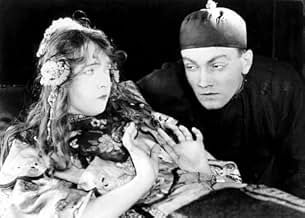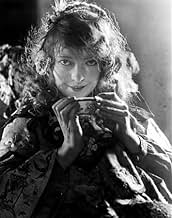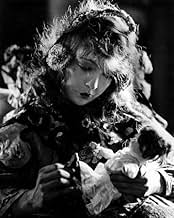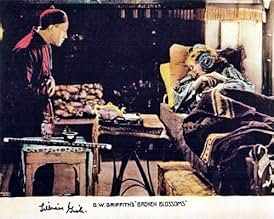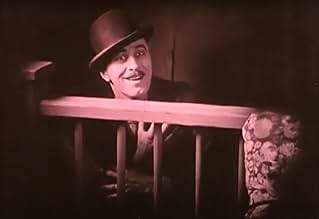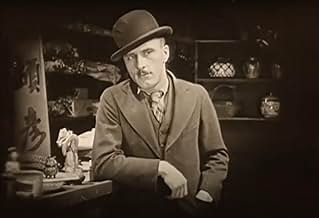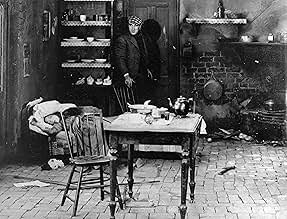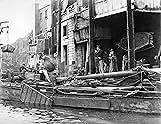IMDb RATING
7.2/10
12K
YOUR RATING
A frail waif, abused by her brutal boxer father in London's seedy Limehouse District, is befriended by a sensitive Chinese immigrant with tragic consequences.A frail waif, abused by her brutal boxer father in London's seedy Limehouse District, is befriended by a sensitive Chinese immigrant with tragic consequences.A frail waif, abused by her brutal boxer father in London's seedy Limehouse District, is befriended by a sensitive Chinese immigrant with tragic consequences.
- Director
- Writers
- Stars
- Awards
- 1 win total
Lillian Gish
- Lucy - The Girl
- (as Miss Lillian Gish)
Richard Barthelmess
- Cheng Huan - The Yellow Man
- (as Mr. Richard Barthelmess)
Edward Peil Sr.
- Evil Eye
- (as Edward Peil)
Ernest Butterworth
- Secondary Role
- (uncredited)
Frederic Hamen
- Secondary Role
- (uncredited)
Wilbur Higby
- London Policeman
- (uncredited)
Man-Ching Kwan
- Buddhist Monk
- (uncredited)
Bobbie Mack
- Ringside Employee
- (uncredited)
Moy Ming
- Minor Role
- (uncredited)
Steve Murphy
- Fight Spectator
- (uncredited)
George Nichols
- Police Constable
- (uncredited)
Karla Schramm
- Burrows' Girlfriend
- (uncredited)
Bessie Wong
- Girl in China
- (uncredited)
- Director
- Writers
- All cast & crew
- Production, box office & more at IMDbPro
Featured reviews
BROKEN BLOSSOMS (United Artists, 1919), directed by DW Griffith, is a little film that's not only quite melodramatic, but terribly, terribly sad. In fact, it's labeled as American cinema's first tragedy. Unlike Griffith's epic masterpieces as THE BIRTH OF A NATION (1915) and INTOLERANCE (1916), each running over two hours in length, BROKEN BLOSSOMS, is in fact a simple story focusing on three central characters (Richard Barthelmess, Donald Crisp and Lillian Gish, in order of their appearance) that deals with touchy subject matters ranging from racial prejudice to child abuse, topics that are still sensitive issues even today.
Based on Thomas Burke's "The Chink and the Child," the story begins in China where Cheng Haun, also known as The Yellow Man (Richard Barthelmess), a young idealist, coming to the London slums where he hopes to convert rude Westerners to the gospel of the gentle Buddha. Instead he makes his living by running a curio shop. Battling Burrows (Donald Crisp), a small-time prizefighter by which the title cards describes him as "an abysmal brute, a gorilla from the jungles of East London," living with his illegitimate daughter, Lucy (Lillian Gish), a tragic figure who waits on him hand and foot. So terrified of him, whenever her father commands her to smile, the frightful Lucy simply pushes up the corners of her mouth with her fingers. After one of her frequent beatings, one night Lucy stumbles out of the house, walking to the Chinese curio shop where she faints in front of Cheng Haun's door. Cheng Haun finds bruised girl and takes her in, tending to her wounds. While under his care, Lucy, called "White Blossom" by the Chinaman, is treated with the kindness and sensitivity she's never had. When Battling Burrows is told of his daughter's whereabouts, he sets out to get "the dirty Chink" and to "learn them both."
In spite of its old-fashioned screenplay with the use of a white actor (Barthelmess) in an Oriental role, BROKEN BLOSSOMS is still timely. Lillian Gish gives an Academy Award winning performance playing the 15-year-old Lucy Burrows. Academy Award meaning that if the best actress award had existed in 1919, Gish would definitely have been recognized with that honor for her achievement in handling a difficult assignment in a believable manner. For famous climatic "closet scene" in which Gish's character, Lucy, locks herself in to avoid another brutal whipping by her father, is as realistic as any performance could ever be. As Burrows breaks the door apart, piece by piece, with an ax, the terrified Lucy, with no place to run nor hide, goes into a frenzy like an trapped animal. Being a silent film, one can virtually hear the screaming coming through the screen. For this scene alone, Gish has proved her capability as one of the finest actresses in this history of film.
With such a depressing theme, BROKEN BLOSSOMS reportedly was a surprise hit upon its release. A very atypical Griffith production to say the least. The sole reason for its success is how Lucy is portrayed on screen, ranging from her tragically sad face and shoulder-length hair adding to the believability to her character, knowing full well that Gish was a young woman in her early twenties enacting the role of a 12 to 15 year-old child. Donald Crisp, the most unlikely candidate in getting any Father's Day cards after this performance, would appear as lovable fathers in numerous family films of the 1940s, as well as earning an Academy Award as Best Supporting Actor for HOW GREEN WAS MY VALLEY (20th-Fox, 1941). It was fortunate to Crisp's credit that his performance of the unsympathetic prizefighter with the colley-flower ear didn't ruin his future in films. Barthelmess, on the other hand, offers a sensitive portrayal of a caring and peaceful Chinaman against the wicked ways of the world. This is the film that elevated Barthelmess to the rank as top leading man through much of the 1920s, one opposite Gish again under Griffith's direction in another classic tale, WAY DOWN EAST (1920).
With a limited amount of actors listed in the cast, the supporting players consists of Arthur Howard as the fighting manager; Edward Piel as Evil Eye; Norman "Kid McCoy" Selby as a prizefighter; and George Nicholas as the Policeman. And was that Roscoe Karns as the reporter in the final portion of the story?
BROKEN BLOSSOMS was one of the twelve selected silent films that was broadcast on public television's 1975 presentation of THE SILENT YEARS, as hosted by Lillian Gish. Prior to its presentation, Gish discussed how the movie came about, and did so again practically word for word in the 1988 Thames video presentation prior to the feature presentation scored by Carl Davis. Over later years, BROKEN BLOSSOMS had been released under numerous video distributors with different music scores and different lengths. The Thames, Republic Home Video (organ scored) and KINO Video collections (with pleasing orchestration) comes closer to the original length of 90 to 95 minutes, restoring the opening segment and plot development (missing from "The Silent Years" broadcast) set in China involving Cheng before coming to the Limehouse district of England. The restored KINO version had been the print used for Turner Classic Movies' "Silent Sunday Nights" for quite some time before converting to new but inappropriate underscoring.
BROKEN BLOSSOMS has become the kind of movie in which success comes only once. This tragic tale was remade in England (with sound) in 1936, but little is known of it today, except for the fact that Griffith was originally slated to be the director. While the 1919 original may not be the sort of movie for all tastes, it's one that will be long remembered, thanks to the remarkable direction by the master, D.W. Griffith, and sensitive portrayals of Gish and Barthelmess combined. (***)
Based on Thomas Burke's "The Chink and the Child," the story begins in China where Cheng Haun, also known as The Yellow Man (Richard Barthelmess), a young idealist, coming to the London slums where he hopes to convert rude Westerners to the gospel of the gentle Buddha. Instead he makes his living by running a curio shop. Battling Burrows (Donald Crisp), a small-time prizefighter by which the title cards describes him as "an abysmal brute, a gorilla from the jungles of East London," living with his illegitimate daughter, Lucy (Lillian Gish), a tragic figure who waits on him hand and foot. So terrified of him, whenever her father commands her to smile, the frightful Lucy simply pushes up the corners of her mouth with her fingers. After one of her frequent beatings, one night Lucy stumbles out of the house, walking to the Chinese curio shop where she faints in front of Cheng Haun's door. Cheng Haun finds bruised girl and takes her in, tending to her wounds. While under his care, Lucy, called "White Blossom" by the Chinaman, is treated with the kindness and sensitivity she's never had. When Battling Burrows is told of his daughter's whereabouts, he sets out to get "the dirty Chink" and to "learn them both."
In spite of its old-fashioned screenplay with the use of a white actor (Barthelmess) in an Oriental role, BROKEN BLOSSOMS is still timely. Lillian Gish gives an Academy Award winning performance playing the 15-year-old Lucy Burrows. Academy Award meaning that if the best actress award had existed in 1919, Gish would definitely have been recognized with that honor for her achievement in handling a difficult assignment in a believable manner. For famous climatic "closet scene" in which Gish's character, Lucy, locks herself in to avoid another brutal whipping by her father, is as realistic as any performance could ever be. As Burrows breaks the door apart, piece by piece, with an ax, the terrified Lucy, with no place to run nor hide, goes into a frenzy like an trapped animal. Being a silent film, one can virtually hear the screaming coming through the screen. For this scene alone, Gish has proved her capability as one of the finest actresses in this history of film.
With such a depressing theme, BROKEN BLOSSOMS reportedly was a surprise hit upon its release. A very atypical Griffith production to say the least. The sole reason for its success is how Lucy is portrayed on screen, ranging from her tragically sad face and shoulder-length hair adding to the believability to her character, knowing full well that Gish was a young woman in her early twenties enacting the role of a 12 to 15 year-old child. Donald Crisp, the most unlikely candidate in getting any Father's Day cards after this performance, would appear as lovable fathers in numerous family films of the 1940s, as well as earning an Academy Award as Best Supporting Actor for HOW GREEN WAS MY VALLEY (20th-Fox, 1941). It was fortunate to Crisp's credit that his performance of the unsympathetic prizefighter with the colley-flower ear didn't ruin his future in films. Barthelmess, on the other hand, offers a sensitive portrayal of a caring and peaceful Chinaman against the wicked ways of the world. This is the film that elevated Barthelmess to the rank as top leading man through much of the 1920s, one opposite Gish again under Griffith's direction in another classic tale, WAY DOWN EAST (1920).
With a limited amount of actors listed in the cast, the supporting players consists of Arthur Howard as the fighting manager; Edward Piel as Evil Eye; Norman "Kid McCoy" Selby as a prizefighter; and George Nicholas as the Policeman. And was that Roscoe Karns as the reporter in the final portion of the story?
BROKEN BLOSSOMS was one of the twelve selected silent films that was broadcast on public television's 1975 presentation of THE SILENT YEARS, as hosted by Lillian Gish. Prior to its presentation, Gish discussed how the movie came about, and did so again practically word for word in the 1988 Thames video presentation prior to the feature presentation scored by Carl Davis. Over later years, BROKEN BLOSSOMS had been released under numerous video distributors with different music scores and different lengths. The Thames, Republic Home Video (organ scored) and KINO Video collections (with pleasing orchestration) comes closer to the original length of 90 to 95 minutes, restoring the opening segment and plot development (missing from "The Silent Years" broadcast) set in China involving Cheng before coming to the Limehouse district of England. The restored KINO version had been the print used for Turner Classic Movies' "Silent Sunday Nights" for quite some time before converting to new but inappropriate underscoring.
BROKEN BLOSSOMS has become the kind of movie in which success comes only once. This tragic tale was remade in England (with sound) in 1936, but little is known of it today, except for the fact that Griffith was originally slated to be the director. While the 1919 original may not be the sort of movie for all tastes, it's one that will be long remembered, thanks to the remarkable direction by the master, D.W. Griffith, and sensitive portrayals of Gish and Barthelmess combined. (***)
D.W.Griffith returns for another one and it would appear that he was still fighting with the demons left over from A Birth of a Nation (1915). He again tried to deal with the fires of racism, but this time with a love story and another appearance by Lillian Gish, in Broken Blossoms (1919). This film's title is actually "Broken Blossoms or the Yellow Man and the Girl". "Yellow Man" refers to the Asian man, Cheng Huan, who falls in love with Gish's Lucy. Right off the bat we get exposed to old time racist terms. The "C" word makes an appearance too. But, Griffith does use this film as a tool to teach a lesson to those who are evil or just plain bad.
It covers a lot of domestic/controversial issues, such as, interracial relationships, child abuse, racism and bullying. It is a hope that this film was the first stepping stone to finding tolerance in the world. It also is a telling lesson about, no matter how civilized you are, you can still do a lot of wrong. Huan (Barthelmess), leaves his homeland to go to England to spread the wisdom of the Buddha to the West and the Anglo-Saxons. It is the biggest mistake he would make in his life. It is a telling story about how the good guy finishes last. The man who comes to the civilized world to try and help make those people better, finds out that he is in the wrong place at the wrong time and nothing but torment befalls him.
Huan assigns himself the job to look after a young woman (Gish), who is terrorized and beaten by her boxer father (Crisp), on a daily basis. Huan has to deal with snitches and liars who align themselves with the evil boxer and in the end finds himself falling into the same dark abyss that he tried to teach others to stay away from. This is an amazing story and has been told many times since, but being that this is a pioneering effort, makes it all the more powerful. True, there are parts that are slow and even boring, but it is that tense situation that starts to build and build until the terrifying and sad end.
8.1 (B MyGrade) = 8 IMDB
It covers a lot of domestic/controversial issues, such as, interracial relationships, child abuse, racism and bullying. It is a hope that this film was the first stepping stone to finding tolerance in the world. It also is a telling lesson about, no matter how civilized you are, you can still do a lot of wrong. Huan (Barthelmess), leaves his homeland to go to England to spread the wisdom of the Buddha to the West and the Anglo-Saxons. It is the biggest mistake he would make in his life. It is a telling story about how the good guy finishes last. The man who comes to the civilized world to try and help make those people better, finds out that he is in the wrong place at the wrong time and nothing but torment befalls him.
Huan assigns himself the job to look after a young woman (Gish), who is terrorized and beaten by her boxer father (Crisp), on a daily basis. Huan has to deal with snitches and liars who align themselves with the evil boxer and in the end finds himself falling into the same dark abyss that he tried to teach others to stay away from. This is an amazing story and has been told many times since, but being that this is a pioneering effort, makes it all the more powerful. True, there are parts that are slow and even boring, but it is that tense situation that starts to build and build until the terrifying and sad end.
8.1 (B MyGrade) = 8 IMDB
The subjects this film deals with are ugly, but the whole thing is done in a beautiful way.
Subjects dealt with are racism, poverty and the reasons why.
The way Griffith deals with these subjects is the contrasts settings. Look at the room above the Chinaman's shop: opulent, festooned with the finest oriental silk. Compare that with the stark squalor of the abode of Lucy and her bruiser of a father. Then there is the education and sophistication of the orientals compared to the simplistic, ill-thought-out racial prejudice of Battling and his cronies.
I also enjoyed the boxing match. Very realistic - not the fantastic nonsense of your Rocky-type bout where a man all but beaten to a jelly suddenly pulls some heavy punches from nowhere and wins the fight.
The acting, as has been mentioned elsewhere, is terrific from all three of the principal characters. Also, their characters are well-drawn. Even Battling Burrows - complete with cauliflower ear - is more than a mere heavy: he boxes for a living, he drinks, he lives in a slum with few worldly possessions. Why?
I find it hard to believe that the films they make nowadays are nowhere near as good as this. Whatever happened to progress?
This film spawned the famous song "Limehouse Blues."
Subjects dealt with are racism, poverty and the reasons why.
The way Griffith deals with these subjects is the contrasts settings. Look at the room above the Chinaman's shop: opulent, festooned with the finest oriental silk. Compare that with the stark squalor of the abode of Lucy and her bruiser of a father. Then there is the education and sophistication of the orientals compared to the simplistic, ill-thought-out racial prejudice of Battling and his cronies.
I also enjoyed the boxing match. Very realistic - not the fantastic nonsense of your Rocky-type bout where a man all but beaten to a jelly suddenly pulls some heavy punches from nowhere and wins the fight.
The acting, as has been mentioned elsewhere, is terrific from all three of the principal characters. Also, their characters are well-drawn. Even Battling Burrows - complete with cauliflower ear - is more than a mere heavy: he boxes for a living, he drinks, he lives in a slum with few worldly possessions. Why?
I find it hard to believe that the films they make nowadays are nowhere near as good as this. Whatever happened to progress?
This film spawned the famous song "Limehouse Blues."
It is rather interesting to compare the silent D.W. Griffith BROKEN BLOSSOMS with its inspiration: the 1916 Thomas Burke short story The Chink And The Child, published in Limehouse Nights (Grant Richards Limited, London). Griffith has deliberately left out, added and changed parts of the story in his film. When Burke's collection of Limehouse stories was published it was feared that the book would be barred by the censor. Recently books by Vere Stacpoole (The Blue Lagoon) and D.H. Lawrence (The Rainbow) has been suppressed, as 'frankness in fiction was frowned upon...' (John Gawsworth - Foreword to: The Best Stories of Thomas Burke, Phoenix House, London, 1950). There were enough worrying themes in the story: its sadism, the utterly impossible interracial love affair and the girl's youth. In Burke's story Lucy is found in an opium joint, where a prostitute has taken her to make a profit out of the virgin. Cheng rescues the 'alabaster Cockney child' - she is only twelve - to bring her '...love and death.' Burke's poetic prose is not always graphic: «He took her hand and kissed it; repeated the kiss upon her cheek and lip and little bosom, twining his fingers in her hair. Docilely, and echoing the smile of his lemon lips in a way that thrilled him almost to laughter, she returned his kisses impetuously, gladly. ... And she was his; her sweet self and her prattle, and her birdlike ways were all his own. Oh, beautifully they loved. ...» Nevertheless elsewhere Burke clarifies the nature of their relation as « It may be that he forgot that he was in London and not in Tuan-tsen. It may be that he did not care. Of that nothing can be told. All that is known is that his love was a pure and holy thing.» Griffith's additions vary from Lucy's artificial smile to Cheng's religious mission. The Christian missionary is also Griffith's invention. He has a dig at Western Christian morality sending missionaries around the world while there's still enough to be done in Battling Burrows's own home town. Near the end Cheng kills Battling Burrows with a handgun as in any American western. In Burke's London Limehouse nights a snake deals with Battling Burrows. Was such a venomous revenge not personal enough to Griffith's American taste?
10drpax
"In this scarlet house of sin, does he ever hear the temple bells?" Broken Blossoms is the movie I use to introduce people to silent film who only know it from Chaplin shorts or Birth of a Nation. It is one of the most sensitive movies ever made, in my opinion, and is usually overlooked in any top 100 movie listing. I fear the oversight is due to the listers not having actually seen it.
The version I have--which is now sadly out of print--is the Thames Video version with Lillian Gish's introduction. It is also the one with the original Louis Gotshalk score, pieces of which are sometimes heard on other versions, but the impact of the full orchestral Gotshalk score is overwhelming on an already exquisite film. If you have a chance to see this version, by all means do so.
In answer to a question in another posting, the movie WAS originally tinted--it was part of the "epic poetry" attempt and was quite common with a lot of Griffith work--even back to "A Corner in Wheat".
While I am an immense Gish fan, a lot has already been said about Miss Lillian in the other comments, so I will concentrate on Dick Bartlemess as Chen Huan. The quote above accompanied by his sad look as he leans against the wall of his curio shop tell it all: wrecked youthful enthusiasm--his despair only temporarily abated by the "pipe" in the Limehouse opium dens. His dreams of youth, all packed away in his garret, are only brought out when the one thing that gives him hope that is goodness amidst all the squalor stumbles into his shop.
Only after Lucy arrives can Chen Huan allow himself to dream--to return to golden days of learning, beauty and goodness and ideals. He literally places his dreams of his lost youth on the trembling body of Lucy, but it such a pristine ideal he dare not "defame" it, or it too will disappear like all his other dreams. He must observe it from afar--almost ephemeral. He knows what Hell is like (even before he was shown the booklet by the Christian Brothers). His hell is his lost heart, his lost love. "Bits and pieces of his shattered life." Almost invariably when I find someone to share the movie with me, they are amazed how well it is made and how well it's core story stands up to today. The particulars of Chinese, Cockney and London are not the point; it is a story of hope and despair, of lovers and dreamers. A mature story for a mature audience.
I often wonder if it could be made today. As open as we think we are, I wonder if the basic story could be told again. No matter--it's been told--excellently
The version I have--which is now sadly out of print--is the Thames Video version with Lillian Gish's introduction. It is also the one with the original Louis Gotshalk score, pieces of which are sometimes heard on other versions, but the impact of the full orchestral Gotshalk score is overwhelming on an already exquisite film. If you have a chance to see this version, by all means do so.
In answer to a question in another posting, the movie WAS originally tinted--it was part of the "epic poetry" attempt and was quite common with a lot of Griffith work--even back to "A Corner in Wheat".
While I am an immense Gish fan, a lot has already been said about Miss Lillian in the other comments, so I will concentrate on Dick Bartlemess as Chen Huan. The quote above accompanied by his sad look as he leans against the wall of his curio shop tell it all: wrecked youthful enthusiasm--his despair only temporarily abated by the "pipe" in the Limehouse opium dens. His dreams of youth, all packed away in his garret, are only brought out when the one thing that gives him hope that is goodness amidst all the squalor stumbles into his shop.
Only after Lucy arrives can Chen Huan allow himself to dream--to return to golden days of learning, beauty and goodness and ideals. He literally places his dreams of his lost youth on the trembling body of Lucy, but it such a pristine ideal he dare not "defame" it, or it too will disappear like all his other dreams. He must observe it from afar--almost ephemeral. He knows what Hell is like (even before he was shown the booklet by the Christian Brothers). His hell is his lost heart, his lost love. "Bits and pieces of his shattered life." Almost invariably when I find someone to share the movie with me, they are amazed how well it is made and how well it's core story stands up to today. The particulars of Chinese, Cockney and London are not the point; it is a story of hope and despair, of lovers and dreamers. A mature story for a mature audience.
I often wonder if it could be made today. As open as we think we are, I wonder if the basic story could be told again. No matter--it's been told--excellently
Did you know
- TriviaThe film was produced by D.W. Griffith for Adolph Zukor's Artcraft company, a subsidiary of Paramount Pictures. However, when Griffith delivered the final print of the film to Zukor, the producer was outraged. "How dare you deliver such a terrible film to me!" Zukor raged. "Everybody in the picture dies!" Infuriated, Griffith left Zukor's office and returned the next day with $250,000 in cash, which he threw on Zukor's desk. "Here," Griffith shouted, "If you don't want the picture, I'll buy it back from you." Zukor accepted the offer, thus making this the first film released by United Artists, the production company formed in 1919 by Mary Pickford, Charles Chaplin, Douglas Fairbanks, and Griffith. It was a remarkably successful film, both critically and at the box office.
- GoofsThe intertitles state, "The Buddha says, 'What thou dost not want others to do thee, do thou not to others.'" It was actually not the Buddha but Confucius' teaching.
- Quotes
Lucy Burrows: Don't do it, Daddy! You'll hit me once too often - and then they'll - they'll hang yer!
- ConnectionsFeatured in The Philco Television Playhouse: The Birth of the Movies (1951)
- How long is Broken Blossoms?Powered by Alexa
Details
Box office
- Budget
- $88,000 (estimated)
- Runtime
- 1h 30m(90 min)
- Sound mix
- Aspect ratio
- 1.33 : 1
Contribute to this page
Suggest an edit or add missing content

